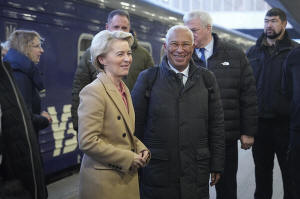Foreign leaders visit Ukraine to show their support on war's 3rd
anniversary
 Send a link to a friend
Send a link to a friend
 [February 24, 2025]
By JUSTIN SPIKE [February 24, 2025]
By JUSTIN SPIKE
KYIV, Ukraine (AP) — A dozen leaders from Europe and Canada visited
Ukraine's capital Monday to mark the third anniversary of the country's
war with Russia in a conspicuous show of support for Kyiv amid deepening
uncertainty about the Trump administration’s commitment to helping it
fend off Russia’s invasion.
Some of Ukraine's most important backers, including European Commission
President Ursula von der Leyen and Canadian Prime Minister Justin
Trudeau, were among the visitors greeted at the train station by
Ukrainian Foreign Minister Andrii Sybiha and the president's chief of
staff, Andrii Yermak.
In a post on X, von der Leyen wrote that Europe was in Kyiv “because
Ukraine is in Europe.”
“In this fight for survival, it is not only the destiny of Ukraine that
is at stake. It’s Europe’s destiny,” she wrote.
Ukrainian and European officials have been rattled by U.S. President
Donald Trump’s cordial approach to Russian President Vladimir Putin and
his tough words for Ukrainian President Volodymyr Zelenskyy.
In a cascade of unwelcome developments for Kyiv, Trump has in recent
days called Zelenskyy a dictator, suggested Ukraine is to blame for the
war and ended Putin’s three-year diplomatic isolation by the United
States. U.S. officials have also indicated to Ukraine that its hopes of
joining NATO are unlikely to be realized and that it probably won’t get
back the land that Russia’s army has occupied, amounting to nearly 20%
of the country.
Meanwhile, Putin’s troops are making steady progress on the battlefield
while Ukraine is grappling with shortages of troops and weapons.

Alarm bells sound in Europe as Washington changes course
The guests, also including European Council President Antonio Costa as
well as the prime ministers of Northern European countries and Spain,
were set to attend events dedicated to the anniversary and discuss with
Zelenskyy further support for Ukraine.
The shift in Washington's policy has set off alarm bells in Europe,
where governments fear being sidelined by the U.S. in efforts to secure
a peace deal and are mulling how they might pick up the slack of any cut
in U.S. aid for Ukraine. The changes have also placed strain on
transatlantic relations.
Costa on Sunday announced that he would convene an emergency summit of
the 27 EU leaders in Brussels on March 6, with Ukraine at the top of the
agenda.
“We are living a defining moment for Ukraine and European security,” he
said in a post on social media.
British Prime Minister Keir Starmer and French President Emmanuel Macron
are to both visit Washington this week.
EU foreign ministers on Monday approved a new raft of sanctions against
Russia. The measures target Russia’s so-called “shadow fleet” of ships
that it uses to skirt restrictions on transporting oil and gas, or to
carry stolen Ukrainian grain. The EU said 74 vessels were added to its
shadow fleet list.
Asset freezes and travel bans were imposed on 83 officials and
“entities” — usually government agencies, banks or companies.
Diplomacy ramps up after record Russian drone attack
The EU’s top diplomat, Kaja Kallas, insisted that the U.S. cannot seal
any peace deal to end the war without Ukraine or Europe being involved.
She highlighted what she claimed were pro-Russian positions being taken
up by the Trump administration.

[to top of second column]
|

European Commission President Ursula von der Leyen and European
Council President Antonio Costa arrive at a train station on the
third anniversary of the Russian invasion of Ukraine, Kyiv, Ukraine,
Monday, Feb. 24, 2025. (AP Photo/Efrem Lukatsky)

“You can discuss whatever you want with Putin. But if it comes to
Europe or Ukraine, then Ukraine and Europe also have to agree to
this deal,” Kallas told reporters in Brussels, where she is chairing
a meeting of EU foreign ministers.
Kallas travels to Washington on Tuesday for talks with U.S.
Secretary of State Marco Rubio.
U.N. Secretary-General António Guterres said the third anniversary
was “a grim milestone.”
“More than 12,600 civilians killed, with many more injured. Entire
communities reduced to rubble. Hospitals and schools destroyed,” he
said in Geneva.
Trump, who is keen to shift the burden for supporting Ukraine onto
Europe, has sought to follow through on his campaign promises to end
the war quickly.
Ukrainian officials say they don’t trust Putin and suspect his
motives. On Sunday, Russia launched its biggest single drone attack
of the war, pounding Ukraine with 267 drones.
Russia's foreign ministry said Saturday that preparations for a
face-to-face meeting between Trump and Putin were underway, and U.S.
officials have said that they had agreed with Moscow to reestablish
diplomatic ties and restart economic cooperation.
And on Sunday, Russian Deputy Foreign Minister Sergei Ryabkov told
the state TASS news agency that “quite a lot” of contact was ongoing
between the Russian and American sides.
Asked whether the U.S. administration is acting in the interests of
Russia or Ukraine’s Western backers, EU chief diplomat Kallas said:
“If you look at the messages that come from the United States, then
it’s clear that the Russian narrative is there very strongly
represented.”
German election winner sends message of support to Kyiv
Kallas rejected Trump’s earlier inflammatory assertion that
Zelenskyy was a dictator for not having held elections after his
regular term expired last year, saying, “Russia hasn’t had elections
in 25 years."
Ukrainian law prohibits elections being held while martial law is in
place, and Zelenksyy said as recently as Sunday that after martial
law is lifted, “there will be elections and people will make their
choice.”

Coming off a victory in Sunday's German elections, conservative
leader Friedrich Merz — also a staunch backer of Ukraine — posted on
X Monday: “More than ever, we must put Ukraine in a position of
strength.“
"For a fair peace, the country that is under attack must be part of
peace negotiations,” Merz wrote.
The U.K. was also expected to announce new sanctions against Russia
on Monday, having earlier described them as the biggest package
since the early days of the war. Foreign Secretary David Lammy on
Sunday said the measures would be aimed at eroding Russia’s
“military machine and reducing revenues fueling the fires of
destruction in Ukraine.”
___
Associated Press writers Lorne Cook in Brussels and Geir Moulson in
Berlin contributed.
All contents © copyright 2025 Associated Press. All rights reserved |